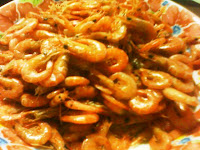Tips on Buying and Storing Food
Having spent several years in the metropolis, I have learned how to (fairly) predict the lifeline of a P500. So I was very much surprised and impressed when Netnet (whom I mentioned in the previous post) came home with so much good food stuff with the P300 I gave her for marketing day. The supplies she got was enough to last the family for three days. Perhaps it was also an advantage that seafood wasn't sold at very high prices despite the storms.
As I helped her prepare for lunch, Netnet told me that "money isn't everything when planning and preparing tasty, nutritious meals." Well-balanced and highly-palatable dishes can be prepared just as well on a small budget as on a lavish one.
As I helped her prepare for lunch, Netnet told me that "money isn't everything when planning and preparing tasty, nutritious meals." Well-balanced and highly-palatable dishes can be prepared just as well on a small budget as on a lavish one.
How is this possible? Let's start with these pointers she gave:
1. Check the available supplies at home before making your shopping list.
- Make only the necessary changes when a product is unavailable or the market has special offers.
2. Buy perishable goods as needed.
- If your budget allows, buy staples such as sugar, rice, and salt in larger amounts. You save a lot this way than going out every now and then to get them from the nearest convenient stores. Just make sure to put them in airtight containers to keep them from moisture and insects (such as ants, bugs, and roaches).
3. Buy fruits in season.
- They are cheaper, but they can provide you with the same vitamins and minerals needed by your family.
4. Buy and prepare just enough for the day's meals.
- Purchasing plenty of fruits and vegetables is not very practical because even with the fridge, they get easily over-ripe and spoiled.

- Minimize table waste by cooking and serving small to medium portions. You're the better judge of this; think of how much your family can finish. Leftovers deteriorate in nutritive value and reheating also reduces palatability. Your mom will not eat the vegetables have grown stale and soggy. Even if your sister likes pork, she will get tired of it when she sees it on the table for a whole week.
- The same applies to canned goods. Buying in large cans is only economical if you need the entire content or you 'll be needing it for other dishes in the near future. But once the can has been opened, it's subject to spoilage.
5. Lastly, know where to get the goods.
- Check out which stores in the market sell fresh meat, fruits, and vegetables.
- When buying canned goods, a-25 centavo difference still matters--as long as it's just in a nearby stall.
Well, there you go. Netnet has indeed a way of stretching the peso.
NOTE: The photos in this entry are all Netnet's purchase for the day. ;-)






1 comment:
nice post. these are things i do. but i wouldnt think about writing it down in a readable way. thats a big. loved it!! now a peso is almost a rupee. so my understanding is that i could pretty much get away with almost everything you are doing here to the same effect.. nice post again.. :D
Post a Comment